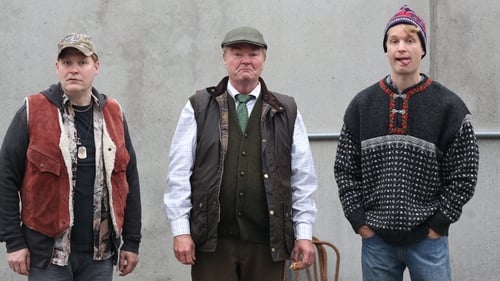
Isabelle
What would you do if you found 30 million that no one was missing? Mahmut decides to do what he has always dreamt of: to be seen as a Swede. He changes his name to Sebastian, rents a nice house, buys a Volvo and starts wearing socks with patterns. But there's a problem, all of the money is in notes that become invalid in two weeks. His new life is threatened and he needs to find a way to launder 30 million in two weeks.

Mankind has always been on the move. Sometimes escaping from something but often also searching for something else.

Åsa Sjöman
Set in 1984, Hans Pettersson (Hasse P.) decides to create the largest sandwich cake ever made in order to put his home town, Köping, on the map.

Caroline Zetterström
Simon Lindström, the popular coach of a suburban junior hockey team is found stabbed to death. Does the murder have something to do with his side project: teaching unaccompanied refugee children to ice skate? This undertaking has certainly not been appreciated by everyone in their small, sheltered community. Martin Beck, who has returned in a more senior position, struggles to find a replacement for the temporary head of the group, Steinar Hovland. But the Norwegian is becoming more and more interested in keeping his new role. The question is whether Martin can trust him?

Carin Göring
Two brothers who could not have been more different. The eldest, Hermann Göring (1893-1946), was a prominent member of the Nazi regime, head of the German Air Force, and a war criminal. The youngest, Albert Göring (1895-1966), opposed tyranny and was persecuted, but today he is still unjustly forgotten, although he saved many lives while his brother and his accomplices ravaged Europe.

The atmosphere in the car is strained when Jimmy's dad drives him and a woman to execute this year's birthday present. A wish that suddenly has the opportunity to become a reality on completely wrong premises.

Six Easy Pieces is based on the book "Six Easy Pieces: Essentials of physics explained by its most brilliant teacher" by Richard P. Feynman. It brings together the foundations of "Film as the Seventh Art; a superb conciliation of the 'Rhythms of Space' and the 'Rhythms of Time'" by Ricciotto Canudo and "Music is the pleasure the human mind experiences from counting without being aware that it is counting" by Gottfried Leibniz. The work deconstructs film as the perfect synthesis of art and technology. Connecting art and science, it romantically refers to an age when artists and scientists had similar concerns and were often one and the same person.






